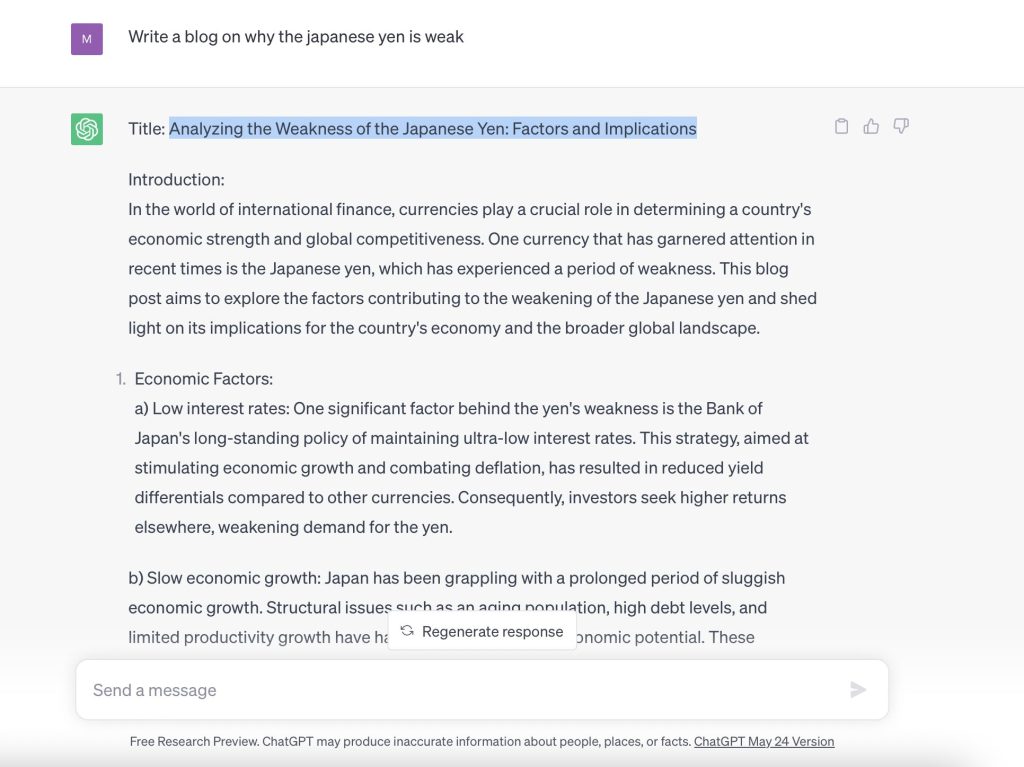Thinking how we can use ChatGPT as a tool other than getting hints on writing property descriptions.
We decided it may be fun to ask CHATGPT questions we may have and to make it a series. Also, use AI to our advantage and work for us a little.
Also, after receiving the information we hope two things are accomplished;
- Learn new information
- Come up with our individual conclusions from the information provided

Introduction:
In the world of international finance, currencies play a crucial role in determining a country’s economic strength and global competitiveness. One currency that has garnered attention in recent times is the Japanese yen, which has experienced a period of weakness. This blog post aims to explore the factors contributing to the weakening of the Japanese yen and shed light on its implications for the country’s economy and the broader global landscape.
1. Economic Factors:
a) Low interest rates: One significant factor behind the yen’s weakness is the Bank of Japan’s long-standing policy of maintaining ultra-low interest rates. This strategy, aimed at stimulating economic growth and combating deflation, has resulted in reduced yield differentials compared to other currencies. Consequently, investors seek higher returns elsewhere, weakening demand for the yen.
b) Slow economic growth: Japan has been grappling with a prolonged period of sluggish economic growth. Structural issues such as an aging population, high debt levels, and limited productivity growth have hampered the country’s economic potential. These challenges erode investor confidence, leading to capital outflows and a weakened yen.
2. Monetary Policy:
a) Quantitative easing: The Bank of Japan’s implementation of aggressive monetary easing measures, including quantitative easing, has had a profound impact on the yen’s value. Large-scale asset purchases and injecting liquidity into the financial system have increased the money supply and contributed to a devaluation of the yen.
b) Inflation expectations: The Bank of Japan has struggled to achieve its inflation target of 2%. Persistently low inflation expectations have resulted in a decline in the relative value of the yen. Investors anticipate that the central bank may maintain accommodative monetary policies for an extended period, further weakening the currency.
2. Trade Dynamics
a) Trade imbalances: Japan’s persistent trade surpluses, driven by strong exports in sectors like automobiles and electronics, have traditionally supported the yen. However, the country has recently faced increased competition from other Asian economies, leading to a decline in its trade surplus. As a result, the yen’s strength has been undermined.
b) Global trade tensions: Escalating trade tensions, particularly between the United States and China, have had a negative impact on the yen. As a safe-haven currency, the yen typically strengthens during periods of global uncertainty. However, ongoing trade disputes and protectionist measures have created a risk-averse environment, causing investors to seek refuge in other safe-haven assets, thereby weakening the yen.
Implications:
- Export competitiveness: The weakened yen provides a competitive advantage to Japanese exporters, as their goods become more affordable in international markets. This, in turn, can boost export-oriented industries and contribute to economic growth.
- Import costs: On the flip side, a weak yen can increase the cost of imports, especially commodities such as oil and raw materials. This can lead to higher input costs for Japanese businesses and potentially impact consumer prices, creating inflationary pressures.
- Tourism and travel: A weaker yen can make Japan an attractive destination for international tourists, as their currencies can buy more yen. This can stimulate the tourism industry and provide a boost to the overall economy.
- Financial markets: The yen’s weakness can impact financial markets, particularly currency carry trades. Investors may borrow in yen due to its low interest rates and invest in higher-yielding assets denominated in other currencies. Fluctuations in the yen’s value can influence the profitability of such trades and impact global financial stability.
Conclusion:
The weakness of the Japanese yen can be attributed to a combination of economic factors, monetary policies, and trade dynamics. While a weaker yen can benefit export-oriented sectors and tourism, it also poses challenges such as higher import costs and potential inflationary pressures. Monitoring these factors and their implications is essential for policymakers, businesses, and investors to navigate the evolving economic landscape in Japan and the global arena.

For additional information or any questions please contact us here
Email: info@remax-apex.com

